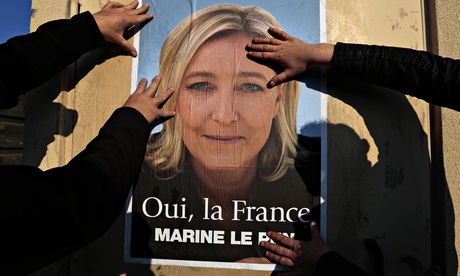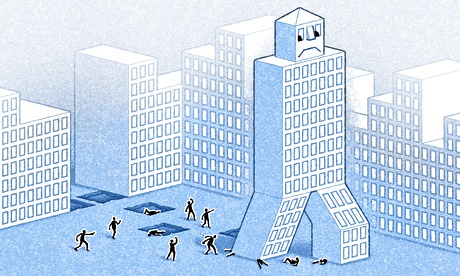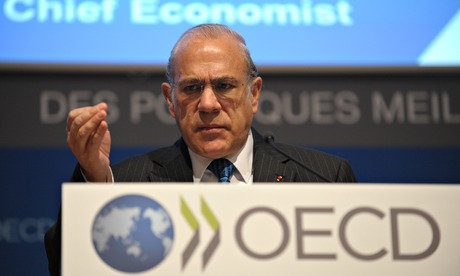Mary Dejevsky in The Independent
Modern life provides many opportunities for bafflement, but the continuing capacity of the British to regard themselves collectively as paragons of public virtue never ceases to amaze.
This week we have seen the lid taken off two prominent areas of our national life – banking (again) and football – to reveal something quite unpleasant beneath. But the response has been – in the first case – to insist yet again on “just a few bad apples” and – in the second – to attack a report that was so misguided as to exonerate Qatar and Russia over their World Cup bids, while fingering England (how dare they?) for being economical with its observance of the rules.
I remember vividly my response to the first reports that bankers in the City of London were suspected of fiddling the Libor rate. I was horrified. Was Libor – the London inter-bank offered rate – not the benchmark for international banking? The standard-setter? If Libor was being manipulated, what did this say about the soundness of UK banking generally? How and why had anyone been able to cook the books for so long? With something as fundamental as Libor, why were there no fail-safe mechanisms for checking?
The two questions that I asked most often, though, were the most basic. How come the only remedies being mooted were fines on the institutions – fines that would ultimately be paid to a large extent by you and me, the taxpayers, seeing as how we had rescued these banks by taking them into public ownership? And even more basically, why had the reputation of the City of London not been tarnished beyond recall? The Prime Minister and the Chancellor were still, it seemed, lavishing time and energy trying to secure some arrangement with Brussels that would minimise the damage to the City from tighter eurozone regulation. Frankly, why bother? Let City banking lie on the bed it has made.
It then transpired that not only Libor was being rigged, but the foreign-exchange market, too, with gung-ho bankers exchanging jocular emails about what they were doing. And not only doing, but getting away with, until last year. What was the price for such cynical profiteering? More fines on the institutions, no doubt plea-bargained down, and again likely to be paid, one way or another, by you and me. Is it not passing strange that the offending emails could be cited verbatim, but that those who sent them remain unnamed? Even stranger, that there are apparently no criminal charges yet being brought? Oh yes, the Serious Fraud Office is apparently looking into that possibility, but such a tentative response hardly inspires confidence.
As a journalist, I find it hard to believe that hacking someone’s voicemail warrants something akin to a show trial and a prison sentence, but swindling the country out of millions of pounds isn’t treated as a crime – at least not one that anyone shows much eagerness to prosecute. Are there frauds that are too big or too brazen to punish? Even the reputational damage seems limited. Far from being diverted to Frankfurt or New York, the money, it seems, continues to roll in. Or is this perhaps a reflection of the sort of money that now flows through London; a quality of money and banking that deserve each other?
And so to the “national game”. When Fifa published its report into allegations of corruption during the most recent bidding process, and essentially absolved Qatar and Russia, the initial reaction here in Britain seemed to veer between disbelief and resignation. After all, Qatar’s bid had succeeded despite summer temperatures that are now requiring the whole global football schedule for 2022 to be rewritten, while questions over Russia’s capacity for bad behaviour are hardly new. When it emerged, however, that Fifa had put someone in the dock for rule-bending, and that someone was England, the response was apoplectic. Righteous indignation hardly begins to describe it.
The fury was palpable, with MPs talking about a “whitewash” and the English FA categorically rejecting charges that it had tried to “curry favour” with the former Fifa vice-president, Jack Warner, despite a list of actions that at least permitted such an interpretation. The former English FA chairman, Lord Triesman, accepted the findings as “legitimate” and “embarrassing”, while also insisting that the report reflected Fifa’s “dislike” of England.
Already turbid waters were further muddied when the US lawyer, Michael Garcia, who actually conducted the inquiry, complained that the report contained “incomplete and erroneous representations”. There is now pressure for his findings to be released in their entirety. But the self-justifying anger the report prompted in London leaves a sour taste and suggests a verb that can be conjugated “I entertain; you offer encouragement; he/she/it gives bribes”.
One consequence could be that the next time the UK casts aspersions on the probity of an Arab state or Russia, the polite response will cite pots and kettles.
What I fail to understand is why the same seems not to apply to the City of London and its banks.




























































